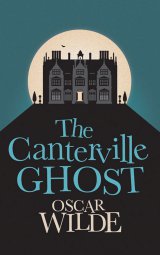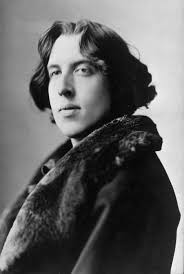The Canterville Ghost Page #6
"The Canterville Ghost" is a short story by Oscar Wilde. It was the first of Wilde's stories to be published, appearing in two parts in The Court and Society Review, 23 February and 2 March 1887.
After this he was not seen again on any nocturnal expedition. The twins lay in wait for him on several occasions, and strewed the passages with nutshells every night to the great annoyance of their parents and the servants, but it was of no avail. It was quite evident that his feelings were so wounded that he would not appear. Mr. Otis consequently resumed his great work on the history of the Democratic Party, on which he had been engaged for some years; Mrs. Otis organized a wonderful clam-bake, which amazed the whole county; the boys took to lacrosse euchre, poker, and other American national games, and Virginia rode about the lanes on her pony, accompanied by the young Duke of Cheshire, who had come to spend the last week of his holidays at Canterville Chase. It was generally assumed that the ghost had gone away, and, in fact, Mr. Otis wrote a letter to that effect to Lord Canterville, who, in reply, expressed his great pleasure at the news, and sent his best congratulations to the Minister's worthy wife. The Otises, however, were deceived, for the ghost was still in the house, and though now almost an invalid, was by no means ready to let matters rest, particularly as he heard that among the guests was the young Duke of Cheshire, whose grand-uncle, Lord Francis Stilton, had once bet a hundred guineas with Colonel Carbury that he would play dice with the Canterville ghost, and was found the next morning lying on the floor of the card-room in such a helpless paralytic state that, though he lived on to a great age, he was never able to say anything again but "Double Sixes." The story was well known at the time, though, of course, out of respect to the feelings of the two noble families, every attempt was made to hush it up, and a full account of all the circumstances connected with it will be found in the third volume of Lord Tattle's Recollections of the Prince Regent and his Friends. The ghost, then, was naturally very anxious to show that he had not lost his influence over the Stiltons, with whom, indeed, he was distantly connected, his own first cousin having been married en secondes noces to the Sieur de Bulkeley, from whom, as every one knows, the Dukes of Cheshire are lineally descended. Accordingly, he made arrangements for appearing to Virginia's little lover in his celebrated impersonation of "The Vampire Monk, or the Bloodless Benedictine," a performance so horrible that when old Lady Startup saw it, which she did on one fatal New Year's Eve, in the year 1764, she went off into the most piercing shrieks, which culminated in violent apoplexy, and died in three days, after disinheriting the Cantervilles, who were her nearest relations, and leaving all her money to her London apothecary. At the last moment, however, his terror of the twins prevented his leaving his room, and the little Duke slept in peace under the great feathered canopy in the Royal Bedchamber, and dreamed of Virginia. V A few days after this, Virginia and her curly-haired cavalier went out riding on Brockley meadows, where she tore her habit so badly in getting through a hedge that, on their return home, she made up her mind to go up by the back staircase so as not to be seen. As she was running past the Tapestry Chamber, the door of which happened to be open, she fancied she saw some one inside, and thinking it was her mother's maid, who sometimes used to bring her work there, looked in to ask her to mend her habit. To her immense surprise, however, it was the Canterville Ghost himself! He was sitting by the window, watching the ruined gold of the yellowing trees fly through the air, and the red leaves dancing madly down the long avenue. His head was leaning on his hand, and his whole attitude was one of extreme depression. Indeed, so forlorn, and so much out of repair did he look, that little Virginia, whose first idea had been to run away and lock herself in her room, was filled with pity, and determined to try and comfort him. So light was her footfall, and so deep his melancholy, that he was not aware of her presence till she spoke to him. "I am so sorry for you," she said, "but my brothers are going back to Eton to-morrow, and then, if you behave yourself, no one will annoy you." "It is absurd asking me to behave myself," he answered, looking round in astonishment at the pretty little girl who had ventured to address him, "quite absurd. I must rattle my chains, and groan through keyholes, and walk about at night, if that is what you mean. It is my only reason for existing." "It is no reason at all for existing, and you know you have been very wicked. Mrs. Umney told us, the first day we arrived here, that you had killed your wife." "Well, I quite admit it," said the Ghost, petulantly, "but it was a purely family matter, and concerned no one else." "It is very wrong to kill any one," said Virginia, who at times had a sweet puritan gravity, caught from some old New England ancestor. "Oh, I hate the cheap severity of abstract ethics! My wife was very plain, never had my ruffs properly starched, and knew nothing about cookery. Why, there was a buck I had shot in Hogley Woods, a magnificent pricket, and do you know how she had it sent to table? However, it is no matter now, for it is all over, and I don't think it was very nice of her brothers to starve me to death, though I did kill her." "Starve you to death? Oh, Mr. Ghost--I mean Sir Simon, are you hungry? I have a sandwich in my case. Would you like it?" "No, thank you, I never eat anything now; but it is very kind of you, all the same, and you are much nicer than the rest of your horrid, rude, vulgar, dishonest family." "Stop!" cried Virginia, stamping her foot, "it is you who are rude, and horrid, and vulgar, and as for dishonesty, you know you stole the paints out of my box to try and furbish up that ridiculous blood-stain in the library. First you took all my reds, including the vermilion, and I couldn't do any more sunsets, then you took the emerald-green and the chrome-yellow, and finally I had nothing left but indigo and Chinese white, and could only do moonlight scenes, which are always depressing to look at, and not at all easy to paint. I never told on you, though I was very much annoyed, and it was most ridiculous, the whole thing; for who ever heard of emerald-green blood?" "Well, really," said the Ghost, rather meekly, "what was I to do? It is a very difficult thing to get real blood nowadays, and, as your brother began it all with his Paragon Detergent, I certainly saw no reason why I should not have your paints. As for colour, that is always a matter of taste: the Cantervilles have blue blood, for instance, the very bluest in England; but I know you Americans don't care for things of this kind."
Translation
Translate and read this book in other languages:
Select another language:
- - Select -
- 简体中文 (Chinese - Simplified)
- 繁體中文 (Chinese - Traditional)
- Español (Spanish)
- Esperanto (Esperanto)
- 日本語 (Japanese)
- Português (Portuguese)
- Deutsch (German)
- العربية (Arabic)
- Français (French)
- Русский (Russian)
- ಕನ್ನಡ (Kannada)
- 한국어 (Korean)
- עברית (Hebrew)
- Gaeilge (Irish)
- Українська (Ukrainian)
- اردو (Urdu)
- Magyar (Hungarian)
- मानक हिन्दी (Hindi)
- Indonesia (Indonesian)
- Italiano (Italian)
- தமிழ் (Tamil)
- Türkçe (Turkish)
- తెలుగు (Telugu)
- ภาษาไทย (Thai)
- Tiếng Việt (Vietnamese)
- Čeština (Czech)
- Polski (Polish)
- Bahasa Indonesia (Indonesian)
- Românește (Romanian)
- Nederlands (Dutch)
- Ελληνικά (Greek)
- Latinum (Latin)
- Svenska (Swedish)
- Dansk (Danish)
- Suomi (Finnish)
- فارسی (Persian)
- ייִדיש (Yiddish)
- հայերեն (Armenian)
- Norsk (Norwegian)
- English (English)
Citation
Use the citation below to add this book to your bibliography:
Style:MLAChicagoAPA
"The Canterville Ghost Books." Literature.com. STANDS4 LLC, 2024. Web. 24 Nov. 2024. <https://www.literature.com/book/the_canterville_ghost_314>.




Discuss this The Canterville Ghost book with the community:
Report Comment
We're doing our best to make sure our content is useful, accurate and safe.
If by any chance you spot an inappropriate comment while navigating through our website please use this form to let us know, and we'll take care of it shortly.
Attachment
You need to be logged in to favorite.
Log In